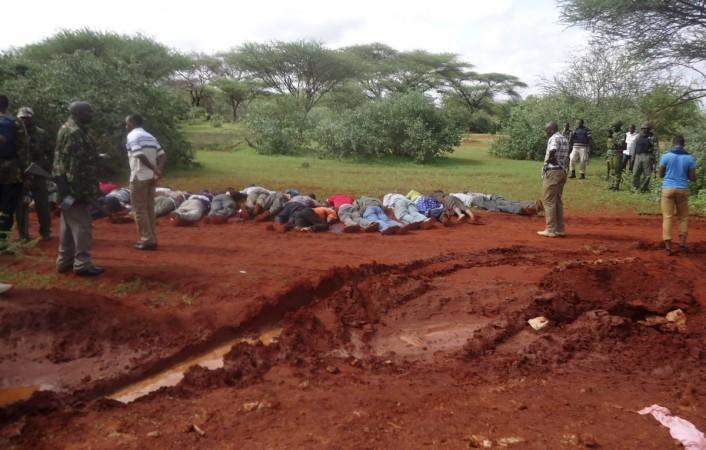
Following the gruesome killings of 28 non-Muslims in a bus attack in Kenya by al-Shabaab militants, Kenyan troops have reportedly killed as many as 100 militants from the Somalia-based terror group.
Kenyan Deputy President William Ruto claimed that the perpetrators of Saturday's attack near the Somali border were identified in two separate operations in Somalia and killed by the troops.
"Following the Mandera bus attack, our security forces swiftly initiated a response. Two successful operations were carried out against the perpetrators of these murderous executions across the border. Our retaliatory action left in its trail more than 100 fatalities. It also destroyed four technicals and the camp from which this crime was planned," Ruto said at a press conference, Kenya's Daily Nation reported.
The Kenyan response came on the same day when armed men stopped a Nairobi-bound bus carrying 60 people in Mandera County and singled out 28 non-Muslims to be killed.
Al-Shabaab claimed responsibility for the killings through its radio station in Somalia, which it said was in retaliation to recent raids by Kenyan security forces on mosques at the Kenyan coast.
The attack, said to be the deadliest in the country in months, was carried out in a style similar to that of the Islamic State, wherein passengers were asked to recite Islamic creeds and those who failed were killed.
Majority of the dead were school teachers, while there were also several health workers.
Survivors recounted the horrific killings:
'Those who could not say the Shahada, a tenet of the Muslim faith, were shot at close range.'
Douglas Ochwodho was at the centre of a line of 29 non-Muslims, who had been singled out for mass execution by the militants on Saturday.
However, as two militants began the gruesome executions from each end, they both thought the other had shot Ochwodho, who lay still till the militants left and was the only non-Muslim to have survived the executions, Associated Press reported.
"Those who could not say the Shahada, a tenet of the Muslim faith, were shot at close range", Ochwodho, a non-Muslim teacher, recounted.
Shahada is an Islamic creed, considered to be the first of the five pillars of Islam, which represents the acceptance of Prophethood of Muhammad.
Nineteen men and nine women, apart from Ochwodho, were asked to lie flat on the ground.
"Two gunmen started shooting those on the ground; one gunman started from the left and other from the right", Ochwodho said, adding that when the gunmen reached him, they were confused on whether either had shot him.
Once the militants had left, Ochwodho took a lift in a pick-up truck back to Mandera, where he is currently being treated for shock.
'The passengers started screaming. Some hid under the seats while others flocked at the door.'
Abdi Hassan, the driver of the ill-fated bus, had left Mandera at about 4 am (local time) on Saturday with 59 passengers. The bus was stopped by rifle-carrying men in military uniform at the Omar Jillow area, the driver told Daily Nation.
"One of them shot at the bus three times and I stopped. They then directed me to drive towards Arabia," he said. "The passengers started screaming. Some hid under the seats while others flocked at the door."
Three gunmen boarded the bus and assaulted the driver, and then forced him to drive towards Arabia, but the bus was stuck on the muddy road because it had rained.
The gunmen then asked the driver and the mechanic to step out.
"We were told to step aside and later heard gunshots," Hassan said.

















